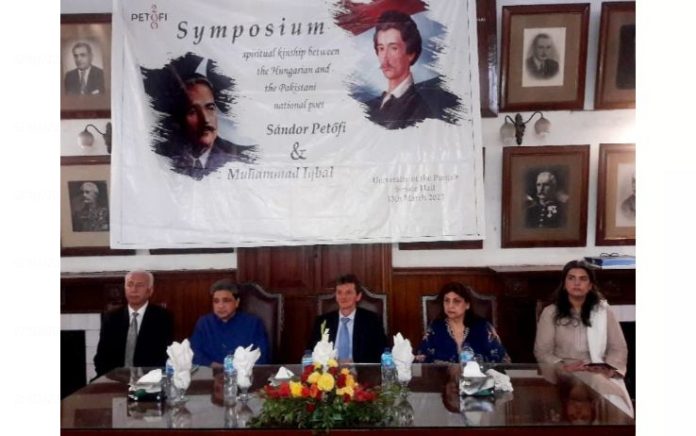Sándor Petőfi and Muhammad Iqbal
ISLAMABAD, MAR 13 /DNA/ – On the occasion of the 200th anniversary of the birth of Sándor Petőfi (1823-1849), the national poet of Hungary, the Hungarian Embassy in Islamabad – in collaboration with the University of the Punjab – organized a Symposium on the spiritual kinship between Petőfi and the Pakistani national poet Muhammad Iqbal (1877-1938).The symposium took place at the Senate Hall of the University that gave a special flavorto the event as the higher education institution was founded by the Hungarian-born professor Dr.Wilhelm Leitner in 1882.
Sándor Petőfi had a significant role in the Hungarian Revolution and War of Independence of 1848-1849. He sacrificed his life for the independence in the war and became the symbol of the Hungarian struggle for freedom. Muhammad Iqbal’s work and ideology were influenced by the poetry of Petőfi, whom Iqbal wrote a poem to pay tribute to his spiritual kin, the Hungarian poet.
The name of Petőfi is certainly not wide-known in Pakistan although the symposium was not the first time when the Hungarian national poet was introduced to the Pakistani audience.In 2007 with the help of a few literature loving Pakistanis, the Embassy of Hungary has published the first ever book of selected poems of Petőfi in Punjabi language. The then Ambassador Mr. Béla Fazekas himself has selected the poems, wrote the foreword while the poems were translated by poetess Mrs. SarwatMohiuddin, who also attended the symposium as guest-speaker.
By organizing the symposium, Mr. Béla Fazekas who came back to Pakistan after 12 years as a second time Ambassador has demonstrated that his dedication to the legendary Hungarian poet was not limited to the publication of Petőfi’s selected poems only. He decided to continue keeping the Pakistani public’s interest in Petőfi alive by focusing on the spiritual kinship of the two national poets, Petőfi and Iqbal. In his speech, the Ambassador highlightedthat a national poet’s fame does not come only from the quality and excellence of his own writing but also from the legend that was built around him by his contemporaries and by the generations that followed. Petőfi’s and Iqbal’s heritage and message are deeply imprinted on the national ego of both the Hungarians and the Pakistanis. The Ambassador shared with the audience the findings of his own research regarding how Iqbalbecame aware of Petőfi’s poetry. He gave a detailed picture on the intermediate role, the well-known intellectual, poet and translator, Umrao Singh Sher-Gil, the father of the famous Hungarian-Indian painter, Amrita Sher-Gil has played in fostering the spiritual bonds between the two national poets notwithstanding the historic and geographic gap separating them.
Besides the Hungarian Embassy and Prof.Dr. Ghulam Moeen-ud-Din Nizami, Dean of Faculty of Oriental Learning (also a poet himself!), Mrs. SarwatMohiuddin also attended the event and she gave a lecture about the linguistic challenges of the translation of Petőfi’s poems from Hungarian to Punjabi language.She read out some of Petőfi’s poems from the Hungarian-Punjabi bilingual Petőfi anthology, which was accepted with loud applause from the audience.Prof.Dr.Nizami highlighted that in accordance with the zeitgeist Iqbal wrote his poems in Persian, therefore the Faculty of Oriental Learninglooks after Iqbal’s poetic legacy. The Dean, being a Persian translator, had been familiar with Iqbal’s Petőfi-poem and he said that that poem was also written in Persian.
The symposium fit perfectly into the series of cultural events organized by the Hungarian Embassy in Lahore. All these events emphasized the centuries long Hungarian cultural presence in the present day Pakistan. After the August Schoefft exhibition in the Walled City in 2021 and the exhibition of the Islamic architectural heritage of Hungary at the University of the Punjab in 2022, the Hungarian Embassy came back to the cultural capital of Pakistan with this outstanding event. One might wonder what comes next…
Mr. Iqbal Salahuddin, grandson of Pakistan’s national poet also attended the event. He said that the symposium brought back fond memories for him. In his address he recalled the old family conversations about how the main message of Petőfi’s poetry, the freedom, influenced his grandfather ideology.

















